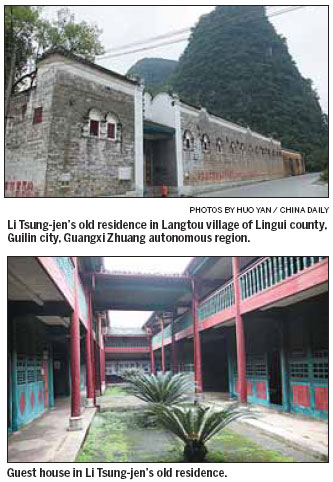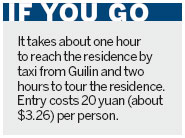Explore history at home base of military genius

Deep in the mountains of Lingui county, Guangxi Zhuang autonomous region, is the former home of Li Tsung-jen, a man of integrity, a renowned military strategist and the acting president of the Republic of China in 1948.
Li gained China's first major victory in the War of Resistance against Japanese Aggression (1937-45) at the 1938 battle of Tai'erzhuang, in Shandong province, when 20,000 to 30,000 enemy troops were killed.
Li was born in 1891, in Langtou village, and was the second boy of eight children. His father, Li Peiying, was a schoolteacher in the village, while his mother, Liu Suduan, was well respected in the community.
Li's elder brother built their Lingui county house in the early 1900s and Li lived there until 1908, when he enrolled at age 17 at a local military school. He revisited the house four times in 1911 as part of his marriage preparations, returned in 1926 for a family gathering, in 1942 for his dying mother, and also in 1948 to ponder his future at a time when the Kuomintang was losing the civil war.
The square residence, circled by 8.5-meter-tall gray-brick walls, covers an area of 5,060 sq meters. It has small baroque-style windows and turrets. Its main gate opens to the north, while there is a saddle-shaped karst hill to its west.
Feng shui masters attribute Li's success to the positioning of the residence in relation to the hill and the well, and believe the gate facing north ensured good fortune would enter the house.
Today, walking into the compound, there is the smell of rotten wood covered by moss, and slippery slates on the ground, and at first it appears the residence is not a large one considering Li had such a large extended family - yet it was big enough to accommodate 3,000 people at the funeral of Li's mother.
Related:
Water carnival to start in September in Guangxi
Beautiful karst mountains in Guangxi















